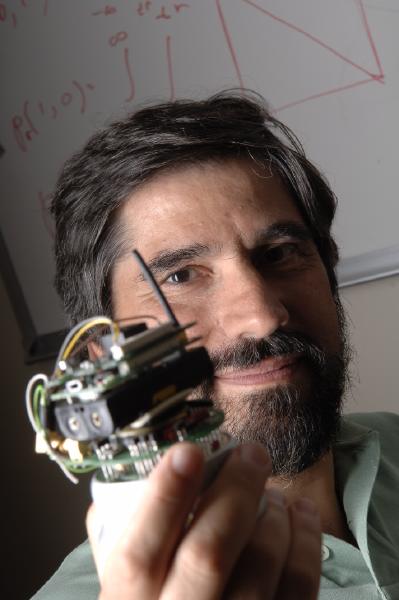Research Focuses on Getting Wireless Networks to Fix Themselves
By Jason L London

Professor Christos Cassandras is the principle investigator on a four-year, $2 million National Science Foundation grant to advance the reconfiguration of autonomous networks. The main test bed for this research will be OpenAir Boston, a private, non-profit organization that will oversee the impending wireless network over the city of Boston.
Professor Christos Cassandras is the principle investigator on a four-year, $2 million National Science Foundation grant to advance the reconfiguration of autonomous networks. The main test bed for this research will be OpenAir Boston, a private, non-profit organization that will oversee the impending wireless network over the city of Boston.
Professor Christos Cassandras is the principle investigator on a four-year, $2 million National Science Foundation grant to advance the reconfiguration of autonomous networks. The main test bed for this research will be OpenAir Boston, a private, non-profit organization that will oversee the impending wireless network over the city of Boston.
The National Science Foundation has awarded Boston University Professor Christos Cassandras (MFG), Associate Professor Ioannis Paschalidis (MFG) and CAS Computer Science Professor Azer Bestavros a four-year, $2 million Emerging Frontiers in Research and Innovation (EFRI) grant to advance the reconfiguration of autonomous networks in the wake of an unexpected problem or system error. The grant, Cassandras said, will be used to develop software that will allow a network to reset itself after an unexpected technical problem or sudden changes in operating conditions. The main test bed for this research will be OpenAir Boston, a private, non-profit organization that will oversee the impending wireless network over the city of Boston.
The project’s research aims to create a fundamental understanding of system reconfigurability.
“This research project is innovative and an excellent complement to our objectives,” Pamela Reeve, chief executive officer of OpenAir Boston, said. “The proposed research will play a crucial role in reaching the goal of a responsive enterprise able to adjust to changing conditions.”
Additional research will be done by placing sensor nodes on trucks inside the warehouse of the Raymond Corp., one of North America’s largest manufacturers and suppliers of electric lift trucks.
“The goal is to develop a network that has the ability to automatically reconfigure itself,” Cassandras, the project’s principal investigator, said. “If a transceiver breaks down, a battery runs out or something fails because of weather, the network will have the capability to reconfigure itself and continue supporting its mission without anyone physically having to correct the problem.”
The opportunity to apply this research to a major urban environment like Boston impressed the National Science Foundation, Cassandras said.
“The fact that we had a test bed over the city of Boston was a unique idea,” he said. “The idea itself is certainly different and ambitious, as is the collaborate effort of Boston University and a private industry like OpenAir Boston.”
Because the OpenAir Boston system will initially incorporate only basic capabilities of a wireless network, the grant will allow the network to add a reconfigurability feature that will incorporate extra intelligence otherwise difficult to do when the wireless network is fully operational.
“This will help make the design robust from the beginning,” Cassandras said. “To retroactively impart extra data to any system is difficult. This will allow us a much better chance of success.”
Much of the grant’s research will be conducted by the Center for Information and Systems Engineering (CISE), a systems engineering collaboration between faculty from the College of Engineering, the College of Arts and Sciences, and the School of Management. CISE will be the main point of collaboration between Boston University and OpenAir Boston. Two professors from the University of Massachusetts will also collaborate on the grant.
“This grant is another success story for CISE,” Cassandras said. “Our hope is that Boston University and CISE become the heart soul of the wireless network in Boston.”
